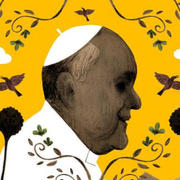
Earlier this summer, Pope Francis released his second Papal Encyclical, Laudato Si’: On Care for Our Common Home.
The encyclical focuses on the relationship between humans and the earth, and it has been understood by many as a powerful commentary on climate change. Nearly five months later, the implications and impact of the encyclical are still unfolding.
In a talk hosted by the Harvard Divinity School Catholics group, professors Dan McKanan, Harvey Cox, and Catherine Brekus, along with doctoral candidate Munjed Murad, came together recently for a public discussion on "Integral Ecology: Capitalism, the Environment, and the Encyclical."
Brekus, an expert on American religious history, began the discussion by circulating in the audience a document detailing Catholic social teachings on the environment prior to Pope Francis's Laudato Si’.
"This encyclical that has gotten so much attention is connected to a much longer Catholic social teaching—not only about the environment, but the common good," Brekus explained.
Legendary Harvard professor Harvey Cox spoke about how the common good in Catholicism is linked to concerns about human limitlessness.
"The Pope is right," Cox said. "We live in a culture where we think there are no limits. Everything is possible. The capitalist system has its inner logic in the necessity for growth. You have to grow or die. But we cannot grow forever on a finite planet."
Dan McKanan shared a brief history of religious affiliations with environmental social movements and presented current statistics about how Catholics and other religious groups are currently responding to climate change. He also shared his own question on whether the Laudato Si’ will only motivate action from Catholics who are already concerned about the environment, or if it has the potential to lead more conservative Catholic political figures—such as former Florida governor Jeb Bush and Supreme Court Justice Antonin Scalia—to rethink their current opinions on environmental issues.
McKanan, whose research focuses on religious movements for social transformation in the U.S., and Cox stated that Laudato Si’ is an important text for divinity school students to read.
"One thing students can learn from this encyclical is how to write a beautiful social statement," McKanan said.
Panelist Munjed Murad, a ThD student at HDS and a resident and Junior Fellow at the Center for the Study of World Religions, discussed a different aspect of the encyclical that has already had a profound impact: Pope Francis's inclusion of a reference to the sixteenth-century Sufi poet Ali al-Khawas.
Murad says this inclusion inspired the Islamic Declaration on Climate Change, released this past summer, and is a step toward interfaith engagement on issues surrounding the environment.
"The connection between the social and the environment is a connection to other connections that can and must be made," Murad said.
Among the panelists, there was no question that Laudato Si’ could be a game changer for the ways that Catholics and non-Catholics think of climate change. The question is, who is reading it and how will they respond?
"There is a question of how many people have and will read it," Brekus commented. "Encyclicals are not bestsellers."
While this is historically true, all of the panelists agreed that Laudato Si’ arrived at a time when interest in the Pope and the themes addressed in the encyclical are of particular interest to people all over the world.
—by Erica Long, MDiv candidate
